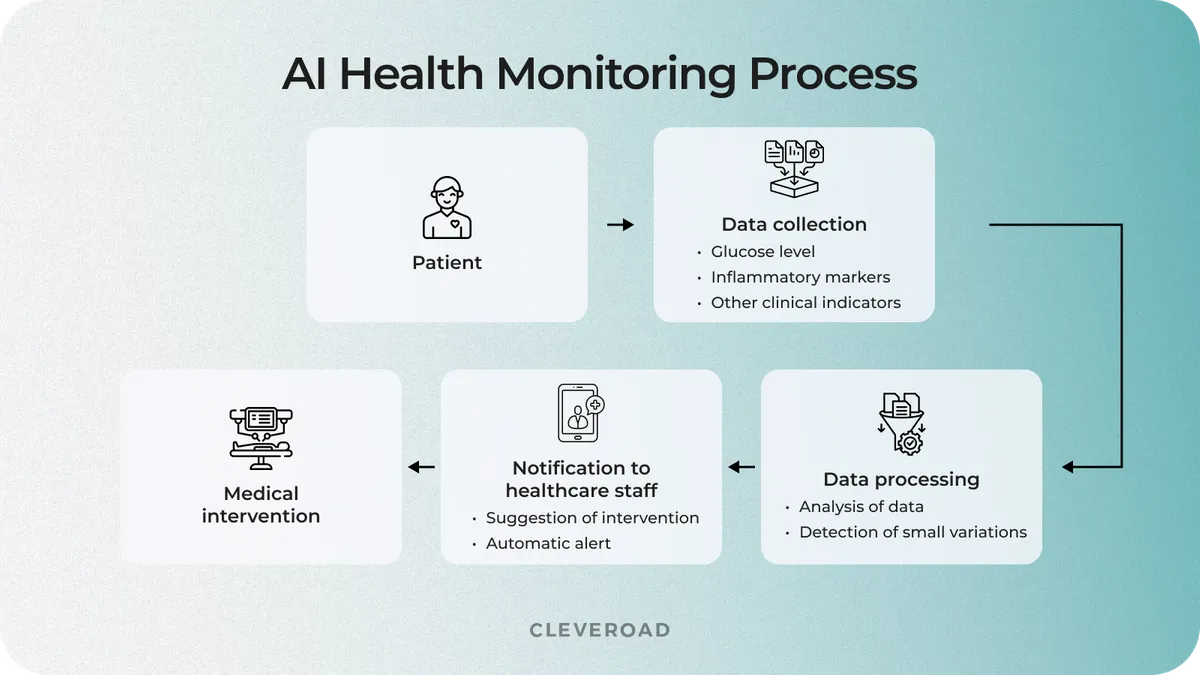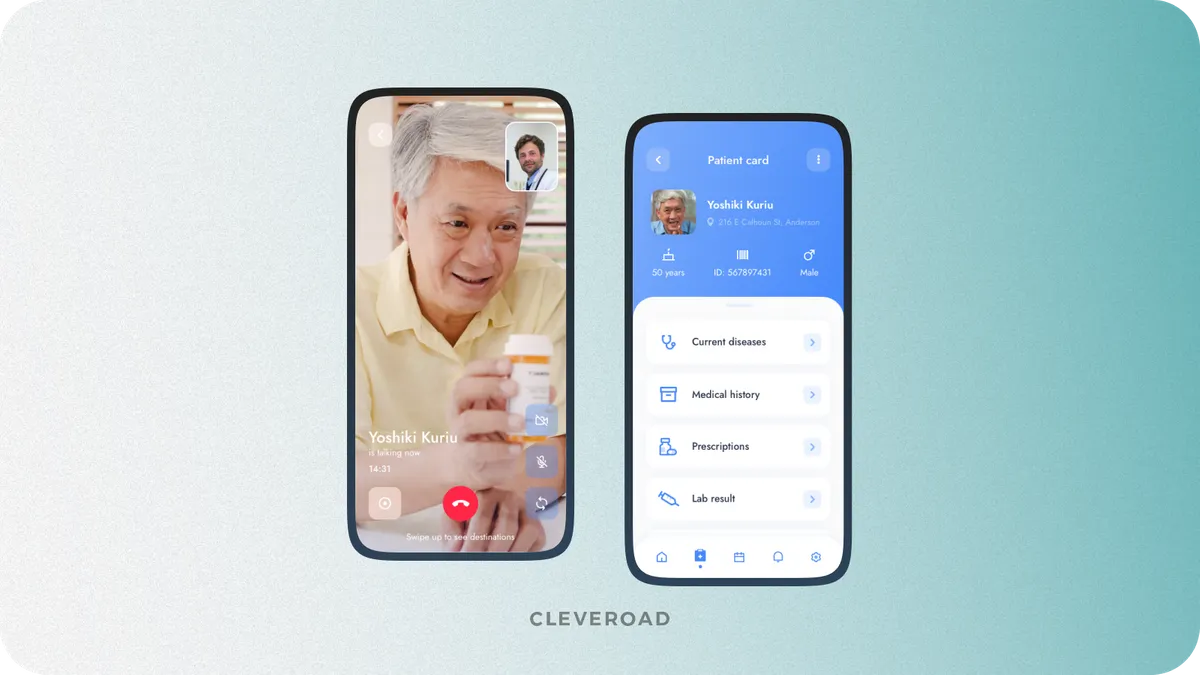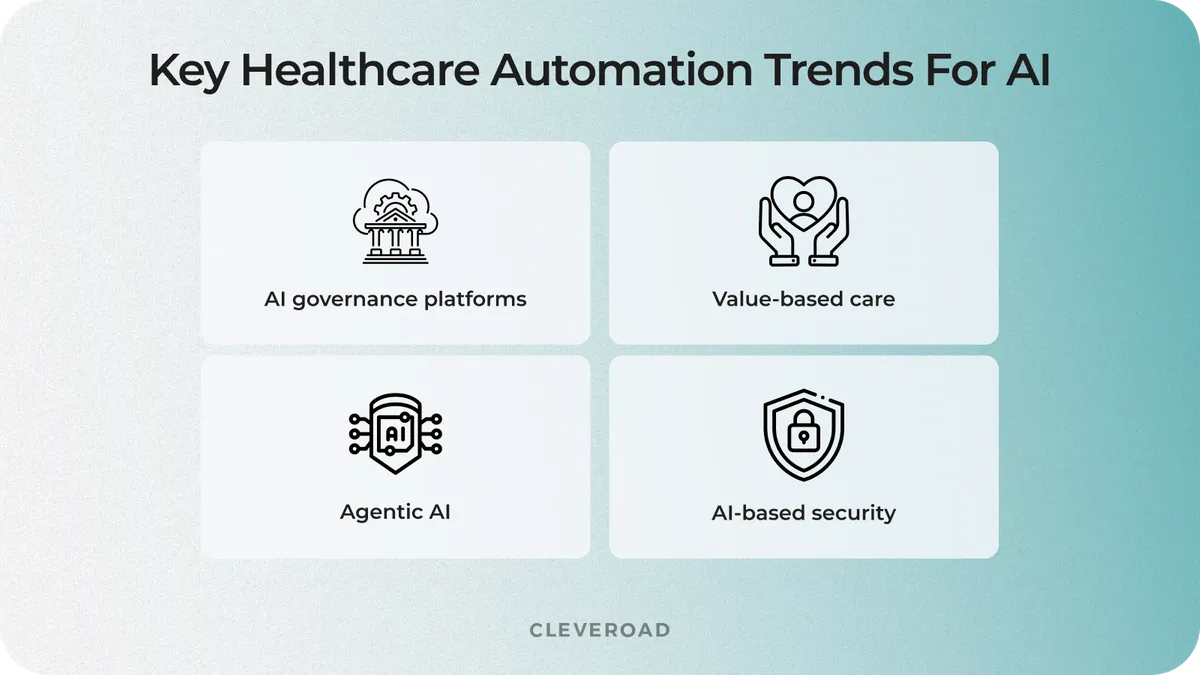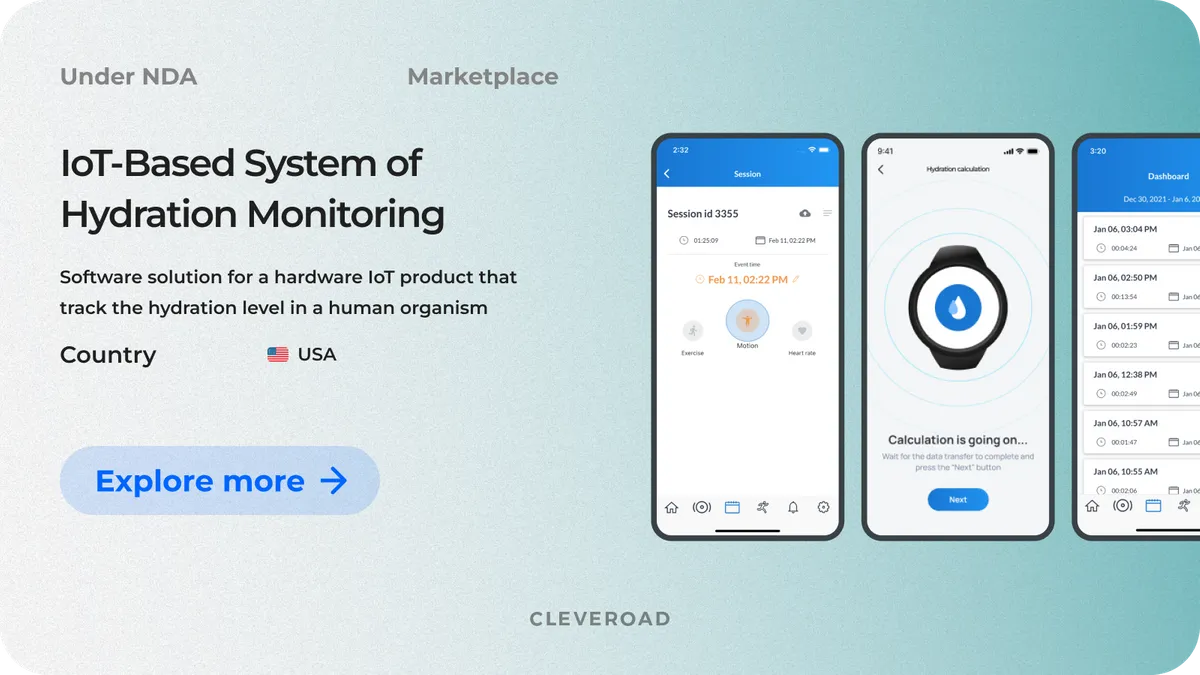RPA and AI in Healthcare: Use Cases, Key Benefits, and Implementation Trends
09 May 2025
15 Min
120 Views
The use of RPA and AI in healthcare is revolutionizing the way that hospitals and healthcare providers conduct business by automating repetitive administrative tasks, improving patient care, and lowering operational costs. Such powerful tools help to automate administrative tasks and improve diagnosis accuracy, thus allowing the medical staff to spend more time with patients.
As healthcare software development experts with 13+ years of experience in the domain and a strong technical knowledge in AI development, we'll describe practical applications, key advantages, and trends currently driving the successful adoption of RPA and AI in healthcare.
What Is RPA and AI in Healthcare?
Robotics Process Automation (RPA) in healthcare means the use of software chatbots to perform rule-based, routine administrative and clinical processes in the healthcare industry. Fundamentally, RPA technology emulates human interactions with digital systems (e.g., Electronic Health Records, billing systems, or claims processing interfaces) so that it performs the following tasks:
- Patients’ notes input and administration
- Filing and verification of insurance claims
- Appointment setting and reminders
- Automation of billing and revenue cycle
- Report on compliance with regulations
RPA can work 24 hours a day and help in decreasing errors. At the same time, it can help free up clinical and non-clinical staff time to focus on more strategic tasks such as patient engagement and decision support. Medical service providers, physicians, and labs can take advantage of AI and RPA in healthcare without having to completely overhaul the infrastructure, according to International Journal of Recent Engineering Service. Furthermore, robotics process automation has the potential to transform itself from rule-based tasks to smart automation for context-aware action and data insight.
How RPA and AI benefit the health domain
Statistics prove that RPA and AI are a new trend in healthcare: according to the Coherent Market Insights report, the RPA in the healthcare market is valued at $2.06 billion in 2025, and this number will grow to $6.05 billion in 2032. As to Strategic Market Research, 98% of IT leaders from different domains consider robotic process automation as a key for financial gains.
Now, let’s share more about the key benefits of RPA and AI in healthcare.
Cutting operational costs
RPA and AI-based automated document processing in healthcare help lower operational expenses of by automating repetitive administrative tasks and lessening the dependency on manual work. Such solutions contribute to more efficient work, error reduction and quicker processes. Thus, more is able to be spent on providing healthcare to patients, and less on overhead costs.
Boosting healthcare staff effectiveness
The use of RPA and AI in healthcare makes organisational staff more efficient by automating habitual administrative functions. This way, the doctors and other health care providers can now spend less time on forms and more with patients. Increasing overall productivity and decreasing the likelihood of burnout and manual errors.
Simplified compliance
RPA with AI ensures prompt and error-free documentation for your clinics or hospital filing and audits, thus dramatically minimizing the danger of penalties. AI is also capable of identifying deviations in high volumes of data, preemptively indicating non-compliant activities.
Quality care enhancement
Healthcare workers and staff can focus on caring for patients when intelligent automation takes care of the administrative part of the work. It not only enhances the quality of care but it also staves off burnout, which is an ongoing challenge for healthcare systems around the world. More efficiency equals a better experience for the patient.
Healthcare RPA and AI Use Cases
The RPA and AI are dynamically transforming the healthcare sector, automating key processes and improving patient experience, as well as reducing clinic staff load. Let’s discuss the particular use cases for RPA and AI in healthcare that will help optimize your healthcare facility workflows.
Automating patient intake and registration
Patient registration includes multiple identical tasks of data input, insurance eligibility checks, and forms retrieval that can impede care and stress hospital staff. Through RPA, clinics are able to simplify repetitive tasks via automatic extraction and validation of patient data from digital forms, ID scans, or EHR systems.
AI and robotic process automation in healthcare speeds up check-in times and reduces human errors, providing consistency of data across systems. In turn, doctors spend more time with patients and less on administrative burdens. It also answers to the demands of world healthcare systems where multilanguage, multilocation coordination is essential. Automating intake with RPA and AI solutions drives tangible efficiencies in operation, compliance, and patient satisfaction.
Monitoring patient data for early risk detection
Monitoring patient records for quicker risk detection is among the most revolutionary AI and RPA use cases in healthcare. This is when robotic process automation in healthcare technology works along with predictive analytics based on AI to detect the first signs for a patient deterioration. For healthcare systems, using RPA can automate the aggregation and structuring of important data from wearables, remote monitoring devices and EHRs by eliminating busywork required for clinicians to do manually.
For example, let’s look at AI-supported sepsis monitoring or diabetes care. In this case, AI algorithms identify small variations in biomarkers (e.g., glucose levels or inflammatory markers), and automatically notify healthcare staff when to intervene. This approach empowers providers to intervene at an early stage, which may save lives and minimize burden on emergency care.

How AI-supported risk management acts in healthcare
Enhancing clinical documentation with AI
Clinicians have to input patient information into EHR platforms for hours at a time, leading to fatigue, distractions from care, and workflow inefficiency. With the help of AI, smart assistants can recommend, auto-fill, or even write the documentation based on voice commands or patient encounters.
An interesting example for this use case would be AI-assisted EHRs processing of doctor-patient dialogues as well as auto-generate structured clinical notes for review. It saves time for documentation, provides higher accuracy and record consistency. And when teamed with implementing RPA, these systems can automatically classify, route, or store documents, eliminating repetitive tasks and the mistakes that come from doing things manually. Such capabilities not only streamline documentation processes, but also help support more efficient healthcare operations.
Simplifying the health insurance process
One of the most exciting use cases for RPA in healthcare is around automating the prior authorization. Nowadays, medical professionals have to navigate convoluted patient portals and individual patient eligibility and submit accompanying info, a laborious process that’s susceptible to errors.
RPA can automate much of this workflow: bots can pull together patient and insurance details, verify eligibility and send out a prior authorization request with little or no human intervention required.
This is where AI and machine learning can work together. AI can predict approval likelihood after reviewing historical authorisation data, such as diagnosis codes, treatment plans, and payer decisions. This allows health systems to auto-approve normal requests, or route more complex cases for manual review, resulting in shortened turnaround times and administrative overhead.
Get advice on a suitable RPA and AI use case for your healthcare facility and receive expert tech assistance through our AI development services!
The Best Practices of Implementing RPA and AI in Healthcare Domain
In order to roll out RPA and AI in healthcare successfully, you need to know exactly what that digital transformation involves, and what you need to do to be ready. Delivering meaningful AI implementation and effective adoption of automation solutions involves careful planning, expert guidance and mindful execution.
Selecting an experienced tech partner
It is crucial to choose the appropriate technology partner to develop and launch RPA software and advanced AI technology in your medical organisation successfully. To create custom healthcare software, the provider must be a true industry expert who knows particular healthcare workflows as well as compliance regulations such as HIPAA and PIPEDA.
It’s also critical to ensure that AI healthcare software development companies you assess will test interoperability with your health systems and that the vendor can embed RPA and AI into EHRs, remote patient monitoring tools, telemedicine platforms and other care solutions. Moreover, they should also have strong artificial intelligence skills to develop scalable, future proof systems.
You should also check out their track record of successful engagements and client reviews on professional websites like Clutch to assess their ability to provide you with personalized healthcare services based on your specific needs. Also make sure that your potential provider has a skilled, stable talent pool in place to be with you throughout the project lifecycle to make a real impact of RPA and AI in healthcare for the long run.
Discover Cleveroad's Clutch page to find out more about our work through the reviews of our customers
Preparing for RPA and AI implementation
The rollout of RPA and AI in healthcare means that you need to set up a strong digital foundation first. A good vendor can offer assistance in carrying out a detailed examination of your current workflows, identifying the right use cases for RPA in healthcare and suggesting how to improve operational performance with focused automations. Before rendering healthcare software development services, they’ll evaluate the state of your infrastructure, data, and systems interoperability so that new technology can readily be plugged in when necessary.
This thoughtful preparation to AI automatization eliminates expensive downtime and ensures your organization is benefitting the most from the automation products. On this, the advice and clarity brought by a professional supplier as to how AI in healthcare, will directly impact their levels of service and patient care perseverance.
Focusing on easiness for UX design
You would expect that adding advanced RPA tools or artificial intelligence technology should make life easier for healthcare providers. Intuitive interfaces showing data analytics or notifying clinicians of vital patient states are critical to support accurate decision-making. For example, reduction of complex patient data to simple graphical summaries has the potential to enhance workflow efficiency. Focusing on transparent UX design will help to ensure that automation truly empowers and doesn't hinder health teams, leading to better patient care and easier systems in the global healthcare domain.

Patient card design for telehealth platform designed by Cleveroad (source: Dribbble)
PoC development
The Proof of Concept (PoC) development will be essential for you if you consider implementing AI and RPA and gain real-world benefits. Starting with a custom PoC containing only a certain functionality module allows you to test the actual impact of RPA and AI on your clinical operations and prove solution’s feasibility.
The PoC stage is critical for you to ascertain impact, measure ROI and become familiar with the value of implementing automation driven improvements on process efficiency. Moreover, it helps you reduce the initial cost of AI in healthcare, so you can decide on smart automation without immediately investing in a full-scale health solution.
Conducting a successful PoC will also help eliminate risks in full-scale deployment of a solution avoiding problems with data, system capacity and workflow early enough to address them before deploying at scale. This not only cuts costs, but it also makes for a much smoother, lower-risk roll-out of the final solution.
Deployment and scaling
The careful scaling of your RPA or AI health solution is one of the most critical facets of success for AI and automation in healthcare. Once you have the PoC that has proven for itself, you can start to scale that up into a fully-featured solution that suits the needs of your organization.
Your technology partner should help you enhance the capabilities and truly join RPA and AI to your current systems. Make sure to allocate resources to train your healthcare workers: this will help overcome resistance to change and facilitate the smooth integration into daily practices.
Moreover, after your healthcare system’s release, the vendor will constantly monitor its performance and enhance your solution. This disciplined implementation is what ensures ongoing viability and extracts the most strategic benefit from deploying a full suite of RPA and AI in healthcare.
By adhering to these best practices of implementing RPA and AI in health domain, you can make the most of these technologies and achieve a high degree of operational efficiency and patient care.
The Key Healthcare Automation Trends for AI
Cutting-edge trends in AI and RPA technologies allow to improve care delivery, reduce operational burden, and increase overall clinical staff efficiency.
Let’s look at the key automation trends that will impact your healthcare organization.
AI governance platforms
The advances of artificial intelligence in healthcare has never been so spectacular, but proper supervision is critically needed for them. AI governance platforms offer structured procedures to assist healthcare professionals to comply with regulations, and to maintain ethical and responsible usage of AI applications. By providing clear guidance and oversight, these platforms enable organizations to navigate the complexity and risk of AI-powered healthcare solutions.
Solid governance is especially important where sensitive patient data and clinical decision-making are concerned. Aligning governance policies with these new use cases of RPA and AI solutions enables a provider to guarantee transparency, accountability, and consistency, which in turn, strengthens patient trust in technology-enabled care delivery.
Value-based care
These value-based care models are focused on the patient and encourage quality of care over quantity of services, so they are the perfect environments for applying RPA and AI in healthcare. With these tools, providers can effectively gauge and improve the quality of care, while ensuring quality healthcare standards are being adhered to. AI-powered analytics help to identify performance gaps, predict patient risks, and focus interventions and resources most effectively.
Automation of manual administrative labor is another step to support value-based care by lowering operational expense and allowing healthcare professionals to concentrate on the quality of patient care. At its core, AI-enabled automation enables valuable patient-centric care that maximizes outcomes and minimizes systemic waste.
Agentic AI
Agentic AI refers to autonomous decision-making and action systems, representing the next frontier for cases of RPA in healthcare. These systems can independently monitor patient conditions, take timely actions, and send critical alerts to clinicians. Such an advanced form of RPA in the healthcare sector provides a notable boost to care responsiveness, especially in critical healthcare environments or chronic disease scenarios.
Additionally, automation enables agentic AI to continuously learn from and adapt to real-time patient data, supporting more accurate and tailored interventions. By integrating these capabilities, providers can reduce clinical errors, increase patient safety, and deploy their human expertise more strategically.
AI-driven security
As healthcare organizations adopt AI and RPA, cybersecurity needs to develop concurrently with them. AI-based security plays a crucial role in the defense of protected patient information, detection of threats in real time, and swift automated responses to incidents. Intelligent systems ensure continuity of operations while fighting back against cyberattacks on a continuous basis on healthcare infrastructures.
By integrating sophisticated security into automation workflows, providers also are able to respond to concerns about patient privacy, while fostering trust in digital tools and solidifying the integrity of care. AI-driven protection is no longer a choice but a necessity within the modern healthcare environment.

Key healthcare automation trends for AI
These RPA and AI in health trends open up new opportunities for medical businesses to drive patient engagement and treatment efficiency. With focused investment in governance, value-driven models, autonomous intelligence, and airtight security, you can achieve more efficient, safe, and patient-centered care for your medical facility.
How Cleveroad Can Help You in Modern Healthcare Development?
Cleveroad is a healthcare software development service provider with 13+ years of experience in the IT industry. Our team has been helping medical institutions to develop high-quality medical software for practitioners, pharmacies, medical device manufacturers and global health providers. We also deliver a variety of MedTech services including custom software development, AI/ML and RPA implementation in healthcare, legacy software modernization, IT consulting, healthcare integrations with the third-party services, and so on.
We specialize in custom medical software development, such as EHR/EMR, Telemedicine software, e-prescribing software, medical billing software, RPM (Remote Patient Monitoring), medical imaging and visualization, etc.
By working with us on implementing RPA and AI in healthcare, you will get the following advantages:
- End-to-end AI automation services, from suitable use case identification and data evaluation to developing, training, and integrating AI models into medical applications.
- Essential certifications that ensure the quality and security of our healthcare solutions: ISO/IEC 27001:2013 for information security and ISO 9001:2015 for quality management
- Your health software integration with third-party healthcare services, such as Kareo, MemoraHealth, Truepill, DailyMed, Twilio, DrChrono, Stripe, and Eligible.
- Access to over 250 highly qualified internal staff members, 75% of whom are middle-level and senior specialists.
- Flexible cooperation models to implement RPA and AI: IT Staff Augmentation, Dedicated Development team, Project-Based collaboration.
Let us represent you one of our successful healthcare software development cases with modern technologies — IoT-based system of human hydration monitoring in real time.
Our client, the US-based commercial and scientific company providing IoT-based telecare services for hydration monitoring, required to have software for their clients to monitor hydration levels right from their devices. They also needed this software to be compliant with 510(k) FDA Medical Device Registration requirements in order to utilize it for partnership programs with sport and healthcare organizations.
To address client’s business needs, we developed a cross-platform Flutter application integrated with an IoT-based hydration sensor from scratch and deployed it for iOS/Android. What is more, we’ve created an Admin panel app for registering users, managing user accounts. Collecting sensor data and figuring out your Hydration Index is all powered by Big Data and ML algorithms. To make the system even smarter, our team added AI analytics that spot patterns of dehydration and give you personalized tips. This upgrade made the system more intuitive, got users more engaged, and helped meet FDA standards.
As a result, the client got a scalable cross-platform application integrated with the sensor allows tracking and controlling the organism’s hydration level. Mobile access provides a greater reach and engagement doubling the user base. The product became legally allowed on U.S. health organizations thanks to FDA 510(k) clearance, and the long-year experience on our side helped the partner grow its partnership program that consisted of some other programs already, and ones that are on this list.
We’ve also collaborated on healthcare software development with health device manufacturers to create a Quality Management System for their document handling.
Our client, Prime Path Medtech, is a USA medical device manufacturers company; they had a legacy Quality Management System, inflexible and outdated. Our specialists created a flexible QMS from scratch, developing an automated platform to reduce manual operations.
As a result, our client received a custom QMS that helped them reduce gross expenditures by 20%, optimize costs on B2B SaaS use for their end customers, and boost competitiveness.
Here’s how Breanne Butler, the Client Liaison Officer from Prime Path Medtech, describes our cooperation:
Breanne Butler, Client Liaison Officer at Prime Path Medtech™
In healthcare, RPA is defined as software robots automating mundane transactions and processes on behalf of clinicians and payers. Coupled with artificial intelligence, RPA helps healthcare organizations in automating the processing of managing electronic medical records, scheduling appointments and billing.
This automation enables healthcare providers to concentrate more on diagnosis and treatment, and also helps to provide better diagnosis in terms of more accurate and more available data.
RPA and AI assist in diagnosis, using big data on medical history to make faster and more accurate clinical decisions. Hospitals and health systems can automate patient onboarding, billing, and interactions and operations of providers and payer organizations. Despite the advantages that both automation and RPA offer, the challenges of RPA in healthcare are to ensure data privacy, accommodating legacy system, and adhering to the strict regulations.
The use of RPA and AI allows healthcare businesses to automate tasks around medical information, automating interactions and transactions between healthcare providers and insurance firms. That means faster delivery of care with less errors and a lower total cost of care.
The role of RPA in the future of healthcare is going to be paramount in the future of the domain for facilitating provider/insurance interactions and transactions. Through the technologies implementation in the healthcare sector, accidents can be solved in the automation of claims, appointments and medical records. Not just for the sake of efficiency, but to cut the cost of healthcare and to make service better.

Evgeniy Altynpara is a CTO and member of the Forbes Councils’ community of tech professionals. He is an expert in software development and technological entrepreneurship and has 10+years of experience in digital transformation consulting in Healthcare, FinTech, Supply Chain and Logistics
Give us your impressions about this article
Give us your impressions about this article
